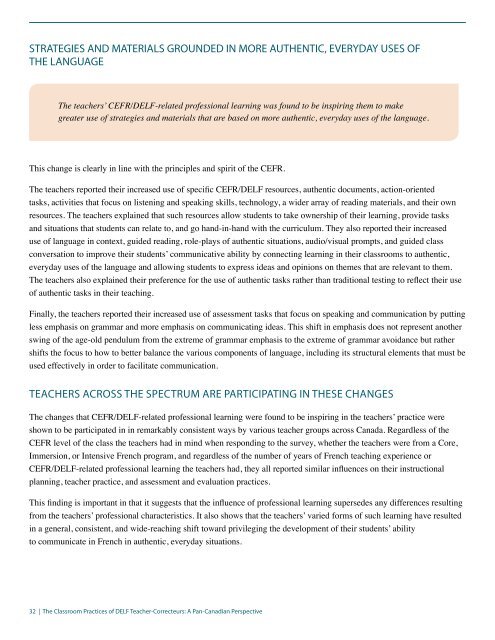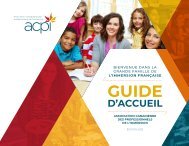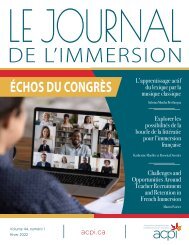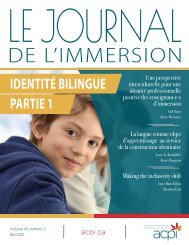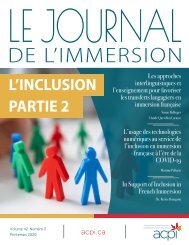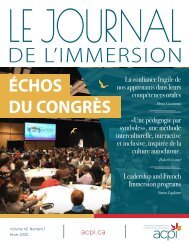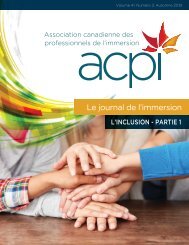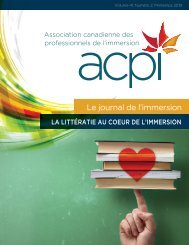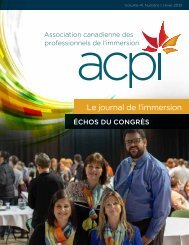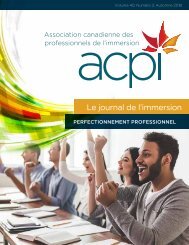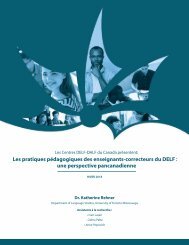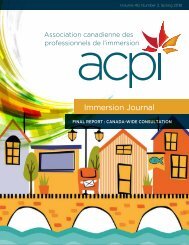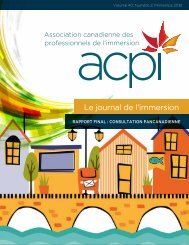Create successful ePaper yourself
Turn your PDF publications into a flip-book with our unique Google optimized e-Paper software.
STRATEGIES AND MATERIALS GROUNDED IN MORE AUTH<strong>EN</strong>TIC, EVERYDAY USES OF<br />
THE LANGUAGE<br />
IMPLICATIONS AND RECOMM<strong>EN</strong>DATIONS<br />
The teachers’ CEFR/DELF-related professional learning was found to be inspiring them to make<br />
greater use of strategies and materials that are based on more authentic, everyday uses of the language.<br />
The profound changes this study has documented in the practice of teachers who have experienced<br />
a range of CEFR/DELF-related professional learning opportunities clearly show that such professional<br />
learning is leading practitioners to enact in their classrooms a CEFR-inspired vision of language.<br />
This change is clearly in line with the principles and spirit of the CEFR.<br />
The teachers reported their increased use of specific CEFR/DELF resources, authentic documents, action-oriented<br />
tasks, activities that focus on listening and speaking skills, technology, a wider array of reading materials, and their own<br />
resources. The teachers explained that such resources allow students to take ownership of their learning, provide tasks<br />
and situations that students can relate to, and go hand-in-hand with the curriculum. They also reported their increased<br />
use of language in context, guided reading, role-plays of authentic situations, audio/visual prompts, and guided class<br />
conversation to improve their students’ communicative ability by connecting learning in their classrooms to authentic,<br />
everyday uses of the language and allowing students to express ideas and opinions on themes that are relevant to them.<br />
The teachers also explained their preference for the use of authentic tasks rather than traditional testing to reflect their use<br />
of authentic tasks in their teaching.<br />
Finally, the teachers reported their increased use of assessment tasks that focus on speaking and communication by putting<br />
less emphasis on grammar and more emphasis on communicating ideas. This shift in emphasis does not represent another<br />
swing of the age-old pendulum from the extreme of grammar emphasis to the extreme of grammar avoidance but rather<br />
shifts the focus to how to better balance the various components of language, including its structural elements that must be<br />
used effectively in order to facilitate communication.<br />
TEACHERS ACROSS THE SPECTRUM ARE PARTICIPATING IN THESE CHANGES<br />
The changes that CEFR/DELF-related professional learning were found to be inspiring in the teachers’ practice were<br />
shown to be participated in in remarkably consistent ways by various teacher groups across Canada. Regardless of the<br />
CEFR level of the class the teachers had in mind when responding to the survey, whether the teachers were from a Core,<br />
Immersion, or Intensive French program, and regardless of the number of years of French teaching experience or<br />
CEFR/DELF-related professional learning the teachers had, they all reported similar influences on their instructional<br />
planning, teacher practice, and assessment and evaluation practices.<br />
This finding is important in that it suggests that the influence of professional learning supersedes any differences resulting<br />
from the teachers’ professional characteristics. It also shows that the teachers’ varied forms of such learning have resulted<br />
in a general, consistent, and wide-reaching shift toward privileging the development of their students’ ability<br />
to communicate in French in authentic, everyday situations.<br />
This vision is not of language as a series of disconnected elements but of language as a system of balanced, integrated<br />
parts that connect to allow for purposeful, authentic communication to take place. This reorientation can be a point<br />
of departure for successful student engagement and meaningful language learning. In fact, the teachers have shared<br />
the positive impacts that they believe a CEFR-inspired approach is having not only on their students’ confidence and<br />
proficiency but also on their own confidence in the efficacy of their classroom practice.<br />
In the spirit of the CEFR and action-oriented approaches, the National DELF meeting participants came together in<br />
November, 2017 and, following a presentation of this research, created a series of practical recommendations designed<br />
to guide stakeholders in the future development of the DELF in Canada. Here is a summary of the key actions:<br />
1. We recommend that Ministries of Education and Boards of Education begin or continue to:<br />
• draw inspiration from the CEFR to develop FSL and Immersion programs;<br />
• offer DELF test-taking opportunities to a greater number of learners;<br />
• work in collaboration at the provincial and national levels in order to advance the CEFR and the DELF in Canada;<br />
• offer CEFR- and DELF-related professional learning opportunities to a greater number of teachers.<br />
2. We recommend that researchers begin or continue to:<br />
• document the results of students who have challenged the DELF;<br />
• compare the educational practices of teachers who have engaged in DELF training with those who have not;<br />
• undertake observations of classroom practice (before DELF training/after DELF training);<br />
• conduct long-term studies of how students are impacted by the DELF and by classroom practices inspired by the<br />
CEFR (longitudinal studies).<br />
3. We recommend that teachers begin or continue to:<br />
• reflect on the principles and spirit of the CEFR and its connection to the DELF;<br />
• find ways to integrate CEFR-inspired educational practices in the classroom;<br />
• share best practices inspired by the CEFR and DELF with other educators.<br />
32 | The Classroom Practices of DELF Teacher-Correcteurs: A Pan-Canadian Perspective DELF Centres of Canada | 33


